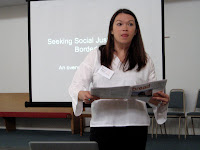 The peace and justice committee at Our Lady of the Most Holy Rosary Catholic Community in Albuquerque wanted to do a townhall meeting in the parish around the issue of hunger.
The peace and justice committee at Our Lady of the Most Holy Rosary Catholic Community in Albuquerque wanted to do a townhall meeting in the parish around the issue of hunger.The question was how to convince parishioners that this was an important topic. In addressing this important question, one of the members of the committee came up with an even more important question. Given the current economic crisis in the U.S., how many members of the parish are suffering from hunger?
The committee, which includes Bread for the World members Virginia Pitts and Ellen Buelow, then decided to put together a survey to try to answer this question. With the help of Fathers Joel Garner and Gene Gries, the committee managed to get more than 900 responses from parishioners to the survey, including 69 who answered in Spanish.
What was touching for me, were the number of people who reached out and handed me their surveys and as I glanced at them, they were letting me know that they were part of the invisible, said committee member Joanne Angel.Roughly one-fourth of the respondents acknowledged that they had been truly hungry, and another one-third said they knew someone who suffered that condition. The survey also asked whether respondents knew people who received food stamps and what type of charity actions they took to address the problem. (See responses below at the bottom of this post).
Here is a touching response (paraphrased).
I will not be able to attend the townhall meeting as I have limited gas. My daughter lost her job and now I have 11 people living with me and I am a single mom who does not quailify for assistance. I have given in the past but am unable to do contribute at this time but will when things get better.And a Spanish speaker who answered the survey said he was amazed to see hunger existing in the land of plenty. The respondent said:
In reality hunger is greater here than in a Third World country because it's here"At the town hall meeting, the committee brought together service providers, including representatives from The Rio Grande Food Project, St. Vincent de Paul, SHARE, The Storehouse and others. Representatives from these organizations talked about how they served the community, both at Holy Rosary and in the Greater Albuquerque area. But the committee thought that addressing the needs had to go beyond charity. I was asked to speak about legislative advocacy (both domestic and international), global poverty and Bread for the World. I urged town hall participants to take part in the parish's offering of letters on the weekend of April 18-19.
The committee is considering strategies to follow up on the results of the survey and the town hall in between now and Hunger Awareness Weekend on June 27-28. A handful of participants were touched enough by the presentations that they joined the parish's peace and justice committee and volunteered for the Rio Grande Food project.
One group [who replied to the evaluations at the town hall] mentioned that we needed to keep hunger on people's mind," said Ms. Angel. "so we are in the process of applying to the archdiocese for a grant.
Survey
Have you ever been truly hungry? Yes 228 No 703
Do you know anyone right now who is hungry? Yes 297 No 629
How many people do you know right now who are receiving food stamps?
None 257
1-5 369
6-10 74
11-plus 61
How do you personally address the hunger issue?
a. donate to local food banks 375
b. contribute to St. Vincent de Paul collection 498
c. Buy SHARE packages to donate to St. Vincent de Paul 121















